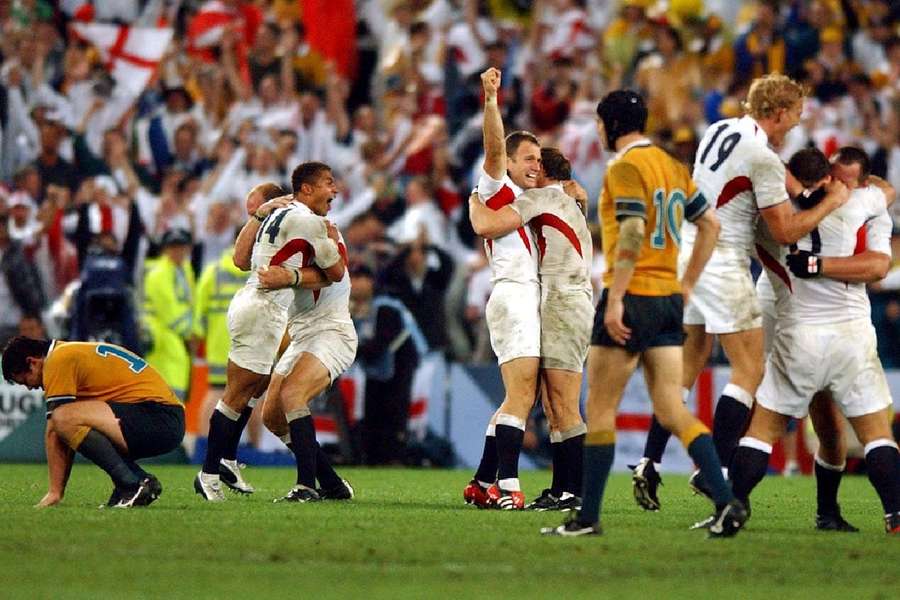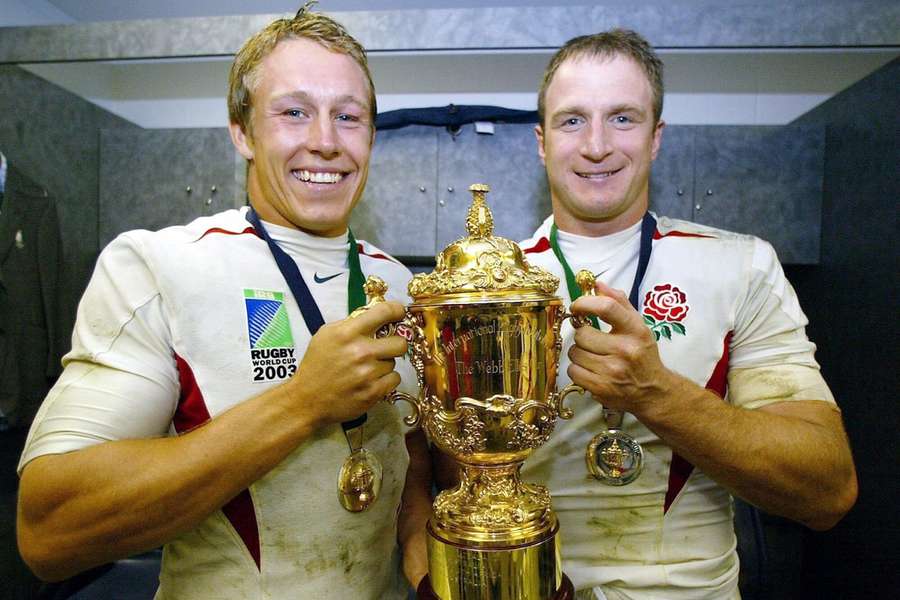A defining sporting moment is like time travel. Watch the footage back or listen to the commentary and you are transported back to the first time that you saw it.
In November 2003, I was sat in a shop car park watching the final between England and Australia on a portable TV - the height of technology at the time - with its flickering pictures and 10-centimetre screen.
Football training for my Under-11 side had finished early so we could all go home and watch Jonny and the boys try to beat the Aussies in their own backyard, however, my dad had other ideas.
He decided, due to rugby fever taking over my home country, that it would be the perfect opportunity to visit the local hardware store and pick up some DIY materials. He sweetened the deal with the small TV, allowing me to watch the final in the back seat of our Renault Scenic.
Like the rest of the nation, I was engrossed by proceedings - a topsy-turvy encounter that ended with one of the most iconic pieces of footage seen in the game.
With time running out, England had a lineout in the Australian half. The game, played in a soggy Sydney had been tense throughout, scoring was difficult and neither side was able to build much momentum.
In a sea of gold and green, the white shirt of scrum-half Matt Dawson picked the ball out of the ruck 30 metres from the Australia try line as he looked to set up a drop goal opportunity for Wilkinson.
England, in a dominant run under coach Sir Clive Woodward, had relied on the fly-half for much of their points. His golden left foot had led the Roses to many victories in the run-up and during the tournament but his three drop-goal attempts in the final had bore no fruit.
Despite that, given his prowess with the boot and with time running out, the most obvious plan of ‘give the ball to Jonny’ was going to happen one way or another.
England knew it. Australia knew it. Everyone around the world knew it. And it was up to his partner in crime, his architect, Dawson, to make it happen.
As the ball came back to the number nine, his usual trick of letting the backs do the running didn’t happen. Instead, he jinked through a chink in the Australian armour to gain a precious 10 metres.
From there, the drop goal was telegraphed for all to see. Dawson regained the ball to tee up his number 10, interestingly on his weaker right foot, to score the three points that sent England to glory.

Back in the Renault Scenic, I was ecstatic but, as a nine-year-old, I didn’t register the magnitude of the moment. It was England’s first-ever Rugby World Cup victory. They had beaten the favourites and the reigning champions on their home turf.
To date, it is still England’s only triumph in the tournament and much like the heroes of other sporting victories, it cemented certain players into English folklore and mythology.
The stoic captain Martin Johnson - a man who led by example rather than by flowery words - became an icon for tradition and for the quiet machismo of the sport born in the nation.
On the other end of that spectrum was the spritely exuberance of winger Jason Robinson. A code-switcher (from Rugby League to Union), the diminutive player was famous for never swearing and when he scored England’s first-half try, he punched the ball in delight before shouting ‘come on!' The passion was there, as was the clean-cut reputation he had carved out for himself.
Somewhere in the middle was the enigmatic Wilkinson. After the World Cup win, he was thrust into the spotlight, where he never seemed too comfortable. His place was on the pitch - his metronomic kicking was as quirky as it was logical, as clinical as it was beautiful. Incredibly he wouldn’t put on an England shirt again for three-and-a-half years.
Their faces were emblazoned on billboards, TV adverts and bookshops for months after the tournament.
Johnson retired soon after as did a few integral members of the squad - leaving at the top seemed a sensible option. Coach Woodward thought so, too. After winning the trophy, he was idolised as a guru of sports psychology just as much as he was seen as a god-gifted rugby master.
His techniques and his attitude to tournament play had led England to the biggest of all prizes but that would be the zenith of his career. His next appointment came as director of football with Southampton - they would be relegated for the first time from the Premier League after the 2004/05 season.
In an England shirt, none of the squad would make an impact quite like they did in 2003. Four years later, and with a much-changed side, they would make the final once again but lost to South Africa in Paris.
That was the opportunity to cement their dynasty in the international game as players but it didn’t happen. As coaches, this was the same. Johnson was brought in for the 2011 World Cup but England could only get to the quarter-finals.
In 2019, England would make another final - this time under Australian coach Eddie Jones but they were unable to beat South Africa once again. Many parallels were drawn to that 2003 team but they couldn’t make it over that final hurdle.
The legacy of that group has somewhat faded and become hazy in the 20 years since. The current England team heading to France for the 2023 edition appear a shadow of their forebears. Having lost three of their four World Cup warm-up games, they enter the tournament this week in terrible form.
Winning a second Web Ellis Cup seems a pipe dream for now but those moments from 2003 live on in the memories, burned into the psyche of the English rugby consciousness. What that did for the nation was to prove that we belonged among the biggest teams and that is what fans will be looking for this year, too.
The landscape of Rugby Union has changed hugely in the last two decades but nostalgia for those halcyon days gives all fans hope that it can happen again. Whether the likes of Owen Farrell can become Wilkinson incarnate remains to be seen, however.
Whatever happens for England at the upcoming tournament, though, the glorious memories of 2003 will always glow.




